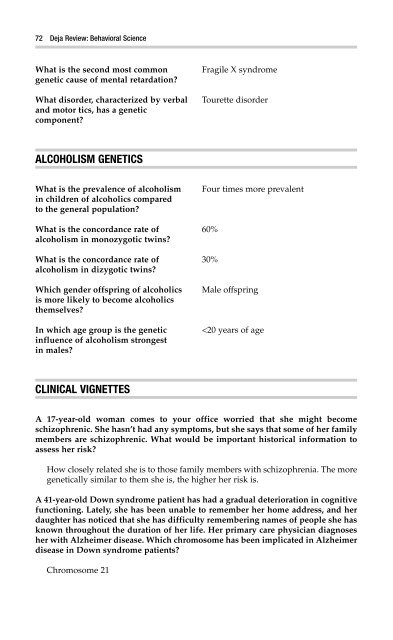Behavioral Science
You also want an ePaper? Increase the reach of your titles
YUMPU automatically turns print PDFs into web optimized ePapers that Google loves.
70 Deja Review: <strong>Behavioral</strong> <strong>Science</strong><br />
Genetic markers on which 1, 6, 8, and 13<br />
chromosome(s) are associated with<br />
schizophrenia?<br />
Does schizophrenia have a familial<br />
component?<br />
Yes—the closer a relative you are, the<br />
more likely you are to develop<br />
schizophrenia; but concordance in twins<br />
is not 100%.<br />
What is the likelihood of developing 10%<br />
schizophrenia if you are a first-degree<br />
relative of an affected individual?<br />
What is the likelihood that a child 40%<br />
will develop schizophrenia if both<br />
parents have the disorder?<br />
What is the likelihood that the 50%<br />
monozygotic twin of a patient with<br />
schizophrenia will develop the<br />
disorder?<br />
What is the likelihood of developing 25%<br />
any mood disorder if you are a firstdegree<br />
relative of a person with bipolar<br />
disorder?<br />
What is the likelihood of developing 60%<br />
any mood disorder if someone is a child<br />
with both parents who have bipolar<br />
disorder?<br />
What is the likelihood of developing 80% to 90%<br />
bipolar disorder if you are the<br />
monozygotic twin of a person with<br />
the disorder?<br />
Is the genetic component stronger for<br />
schizophrenia or bipolar disorder?<br />
In which gender is the lifetime<br />
prevalence of a major depressive<br />
disorder higher?<br />
Bipolar disorder<br />
Females<br />
What is the percentage of males who 10%<br />
will develop a major depressive<br />
disorder in their lifetime?<br />
What is the percentage of females 15% to 20%<br />
who will develop a major depressive<br />
disorder in their lifetime?



